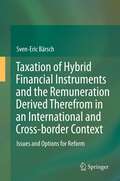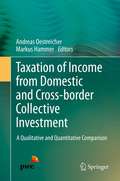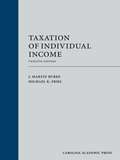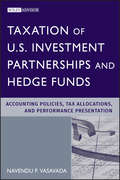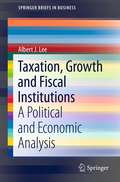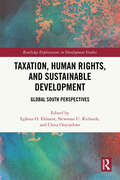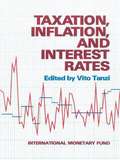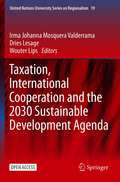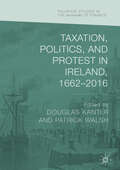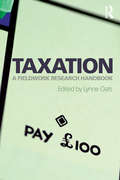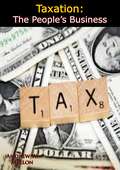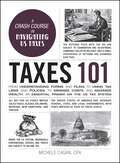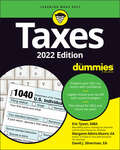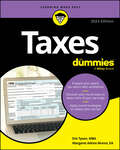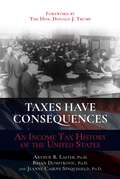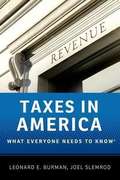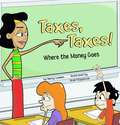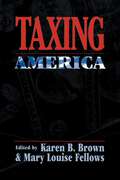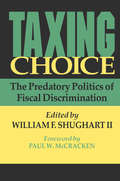- Table View
- List View
Taxation of Hybrid Financial Instruments and the Remuneration Derived Therefrom in an International and Cross-border Context: Issues and Options for Reform
by Sven-Eric BärschDespite the enormous diversity and complexity of financial instruments, the current taxation of hybrid financial instruments and the remuneration derived therefrom are characterized by a neat division into dividend-generating equity and interest-generating debt as well as by a coexistence of source- and residence-based taxation. This book provides a comparative analysis of the classification of hybrid financial instruments in the national tax rules currently applied by Australia, Germany, Italy and the Netherlands as well as in the relevant tax treaties and EU Directives. Moreover, based on selected hybrid financial instruments, mismatches in these tax classifications, which lead to tax planning opportunities and risks and thus are in conflict with the single tax principle, are identified. To address these issues, the author provides reform options that are in line with the dichotomous debt-equity framework, as he/she suggests the coordination of either tax classifications or tax treatments.
Taxation of Income from Domestic and Cross-border Collective Investment: A Qualitative and Quantitative Comparison
by Markus Hammer Andreas OestreicherThe Fund Reporting Cloud® has made tax reporting less complex, but comparing the effective tax treatment of investment funds and their investors in an international environment is still an ambitious task. Against this background, this study examines the tax consequences at fund, asset, and investor level. In geographical terms our comparison covers eleven European countries, the USA, and Japan. Our analysis of the relevant tax provisions, which is of a primarily qualitative nature, is complemented by a quantitative comparison of the tax burden for a model investor investing assets nationally in the form of a collective investment. It will be of interest both for investors seeking tax advantages and for governments to check whether there is a need for tax reforms. It also ties in perfectly with the current evaluations at OECD level in the context of TRACE.
Taxation of Individual Income
by J. Martin Burke Michael K. FrielThe twelfth edition of Taxation of Individual Income approaches the study of individual income tax through the problem method. The text is designed as a series of self-contained chapters featuring a set of problems, assignments to pertinent Code and Regulation provisions, an overview of the chapter topic, and edited cases and administrative materials as well as self-assessment tools.
Taxation of Individual Income (Tenth Edition)
by J. Martin Burke Michael K. FrielTaxation of Individual Income is a leading casebook that employs a unique problem method, which many past students have found to be highly effective, stimulating, challenging and enjoyable. Students are provided material that allow them to arrive at their own conclusions about income tax concepts, rather than the text merely setting out such concepts for them. Each chapter begins with a set of problems with learning objectives and a list of relevant terms without definitions. These features are then followed by a detailed overview, relevant cases, administrative rulings, and legislative history. After reading the materials, students return to the beginning of the chapter to address the problems and define the vocabulary terms.
Taxation of U.S. Investment Partnerships and Hedge Funds: Accounting Policies, Tax Allocations, and Performance Presentation (Wiley Professional Advisory Services #1)
by Navendu P. VasavadaA new, lucid approach to the formulation of accounting policies for tax reporting Unraveling the layers of complexity surrounding the formulation of accounting policies for tax reporting, Taxation of US Investment Partnerships and Hedge Funds: Accounting Policies, Tax Allocations and Performance Presentation enables your corporation to implement sound up-front accounting and tax policies in order to reduce the overall cost of CFO and legal functions within a U.S. Investment partnership. Understand the pitfalls and optimize across legitimate policies that are consistent with the IRS regulations Presents a clear roadmap for accounting, tax policies, tax filing and performance presentation for US investment partnerships and hedge funds Providing tremendous understanding to a complex topic, Taxation of US Investment Partnerships and Hedge Funds is guaranteed to demystify the inner workings of the formulation of accounting policies for tax reporting.
Taxation, Human Rights, and Sustainable Development: Global South Perspectives (Routledge Explorations in Development Studies)
by Eghosa O. Ekhator Newman U. Richards Chisa OnyejekweThis book investigates the relationship between human rights and taxation, exploring how human rights have been impeded or enhanced through tax laws and policies, and what this means for sustainable development in the Global South.Drawing on cases from across the Global South, the book demonstrates the benefits of embedding human rights into tax policies and legislation. The authors not only highlight the role of legislative measures and other human rights regulations in the realisation of international treaty rights but also argue that it creates an environment whereby individuals feel duty-bound to pay taxes, when necessary, thereby securing a sustainable revenue source for the state to meet their socio-economic responsibilities. The book investigates key topics such as compliance, redistribution, e-commerce, tax havens, and the role of key stakeholders.This book will be useful for researchers from across the fields of law, human rights, taxation, and sustainable development.
Taxation, Inflation, and Interest Rates
by Vito TanziA report from the International Monetary Fund.
Taxation, International Cooperation and the 2030 Sustainable Development Agenda (United Nations University Series on Regionalism #19)
by Dries Lesage Irma Johanna Mosquera Valderrama Wouter LipsThis open access volume addresses the link between international taxation, the 2030 Sustainable Development Agenda and the medium-term revenue strategy concept. It also analyses how countries and governments can reinforce this link in current and future initiatives in international taxation, including the base erosion profit shifting project initiated by the Organization for Economic Co-operation and Development with the political mandate of the G20. It discusses the 2030 Sustainable Development Agenda that are relevant for taxation and assesses the current work done by international organizations, regional tax organizations and countries to achieve these Sustainable Development Goals. The contributions to this volume provide an interdisciplinary mix of expertise in tax law, international political economy, global governance and international relations. Through these different perspectives, this volume provides an elaborate reference and evaluation framework for multilateral cooperation on tax and development to strengthen the revenue system of developed and developing countries. This topical volume is of interest to students and researchers of the social sciences, law and economics, as well as policy makers working on taxation.
Taxation, Politics, and Protest in Ireland, 1662–2016 (Palgrave Studies in the History of Finance)
by Douglas Kanter Patrick WalshThis book examines the politics of taxation in Ireland between the seventeenth and twenty-first centuries. Combining political, economic, and policy history, it contributes to a growing interdisciplinary literature on public finance, while also providing context for the ongoing debate on taxation and austerity in post-Celtic Tiger Ireland. Taxation, Politics, and Protest in Ireland illuminates a neglected aspect of Irish history, and will be of interest to scholars, policymakers, and members of the public who wish to understand a subject that is central to the modern Irish experience.
Taxation, Responsiveness and Accountability in Sub-Saharan Africa
by Wilson PrichardIt is increasingly argued that bargaining between citizens and governments over tax collection can provide a foundation for the development of responsive and accountable governance in developing countries. However, while intuitively attractive, surprisingly little research has captured the reality and complexity of this relationship in practice. This book provides the most complete treatment of the connections between taxation and accountability in developing countries, providing both new evidence and an invaluable starting point for future research. Drawing on cross-country econometric evidence and detailed case studies from Ghana, Kenya and Ethiopia, Wilson Prichard shows that reliance on taxation has, in fact, increased responsiveness and accountability by expanding the political power wielded by taxpayers. Critically, however, processes of tax bargaining have been highly varied, frequently long term and contextually contingent. Capturing this diversity provides novel insight into politics in developing countries and how tax reform can be designed to encourage broader governance gains.
Taxation: A Fieldwork Research Handbook
by Lynne OatsTaxation is a subject of enquiry that cuts across a range of disciplines, including law, economics, politics, psychology, history and accountancy, to name a few. However, research into taxation as a social and institutional phenomenon – rather than as abstraction from the real world – is largely neglected. Taxation: A Fieldwork Research Handbook opens up new avenues of enquiry in the research of taxation by offering suggestions on how research might be conducted into actual tax practice, rather than abstract models. This book: Introduces tax as a field of enormous potential for research to all social scientists Explains the methodological issues relating to tax research Provides new opportunities for tax researchers to widen the scope of their enquiries Encourages researchers to think differently about this subject Given the importance of taxation to modern society, not only as a revenue raising mechanism, but also as a tool of governance used to influence social actors, this unique text is a vital read for any social science researcher interested in this subject.
Taxation: The People’s Business (Big Business)
by Andrew W. MellonOriginally published in 1924, this book contains various explanations and views on the American tax system by the reformer Andrew Mellon. During his 11 years in office as Secretary of the Treasury, he cut income taxes, reduced public spending, and brought an end to the excess profits tax--all while reducing the federal debt left over from World War I. Mellon's views on taxation expressed within this book have appeared in letters to Committee of Congress and various organizations and individuals, and are used throughout to illustrate his points, whilst also serving to publish them in a compact form, in one volume. The book also includes various tables and documents of scholarly interest.
Taxes 101: From Understanding Forms and Filing to Using Tax Laws and Policies to Minimize Costs and Maximize Wealth, an Essential Primer on the US Tax System (Adams 101 Series)
by Michele CaganLearn the ins and outs of paying taxes with this engaging, informative, and easy-to-navigate guide to the US tax system.If you want to understand your finances, you need to understand your taxes. Learn everything you need to know about the US tax system and become more financially independent with Taxes 101. As people become more motivated to be as financially literate as possible, understanding every part of their financial wellness is key. With Taxes 101, you will learn the basics of the US tax system, from the system structure and kinds of taxes to all the tax laws that lead to deductions and credits and the forms associated with filing. This all-in-one financial resource lays the foundation with basic information about the tax system so you can make better choices about your financial wellness.
Taxes For Dummies: 2022 Edition
by Eric Tyson David J. Silverman Margaret Atkins MunroTake the anxiety out of tax season and file your return with confidence In Taxes For Dummies, 2022 Edition, you'll get line-by-line advice and plan ahead strategies that take the fear and anxiety out of tax season and save you money now and in the months and years ahead. This completely updated edition includes detailed coverage of the numerous tax bills have passed in recent years. You'll learn everything you need to know to file your own taxes with confidence and intelligently plan year-round tax strategies. In this book, you'll: Discover how to take advantage of every deduction and tax credit that applies to your specific circumstances Learn to navigate the IRS website and the newest versions of the most popular online tax preparation and filing options Understand new retirement account options and the implications of new foreign taxation rules Plan ongoing, multi-year tax strategies that will help you achieve your financial goals at every stage of your life Taxes For Dummies, 2022 Edition is the perfect resource for any United States taxpayer planning to file their own 2021 taxes. Whether you're a first-time taxpayer, an expat filing from outside the US, or a seasoned veteran of tax season looking for the latest deductions and strategies to reduce your tax bill, this book is a must-read resource that'll transform how you think about taxes.
Taxes For Dummies: 2024 Edition
by Eric Tyson Margaret A. MunroCut your tax bill down to size with year-round tips and tricks Taxes For Dummies is the antidote to the annual headache that is the U.S. tax system. This book paves the way for you to file a return that maximizes all the deductions and credits available to you. It also provides insight on making smart financial decisions that help minimize your tax burden. Need to correct or revise a return? You’ll find all the information you need to do it right this time. And, of course the A-word is covered—learn what to do if the IRS shows up on your doorstep to audit your return. This new edition provides updates on the latest changes to the U.S. tax system, so you can sail through this year’s tax season, headache free. Prepare your yearly tax return with confidence Apply sound strategies to reduce your tax bill Discover year-round ways to keep more of your earnings Create a tax-savvy financial plan, with or without the help of an advisorWith Taxes For Dummies, anyone seeking a deeper understanding of the U.S. tax filing system can learn what they need to save money and manage taxes throughout the year.
Taxes Have Consequences: An Income Tax History of the United States
by Arthur B. Laffer Brian Domitrovic Jeanne Cairns SinquefieldThe definitive history of the effect of the income tax on the economy.Ever since 1913, when the United States first imposed the income tax via constitutional amendment, the top rate of that tax has determined the fate of the American economy. When the top rate has been high, as in the late 1910s, the 1930s, 1940s, 1950s, and 1970s, the response of those with money and capital has been to curtail real economic activity in favor of protecting assets and income streams. Huge declines have come to the economy in these circumstances. The most brutal example was the Great Depression itself. When the top tax rate has been cut and held at reduced levels—as in the 1920s, the 1960s, in the long boom of the 1980s and 1990s, and briefly in the late 2010s—astonishing reversals have occurred. The rich have brought their money out of hiding and put it to work in the economy. The huge swings in the American economy since 1913 have had an inverse relationship to income tax rates.
Taxes and Trust: From Coercion To Compliance In Poland, Russia And Ukraine
by Marc P. BerensonTaxes and Trust is the first book on taxes to focus on trust and the first work of social science to concentrate on how tax policy actually gets implemented on the ground in Poland, Russia and Ukraine. It highlights the nuances of the transitional Ukraine case and explains precisely how and why that 'borderland' country differs from the more ideal-types of coercive Russia and compliance-oriented Poland. Through nine bespoke taxpayer surveys, an unprecedented bureaucratic survey and more than fifteen years of qualitative research, the book emphasizes the building and accumulation of trust to transition from a coercive tax state to a compliant one. The context of the book will appeal to students and scholars of taxation worldwide and to those who study Russia and Eastern Europe.
Taxes in America: What Everyone Needs to Know
by Leonard E. Burman Joel SlemrodThe book focuses on U.S. tax policy and offers an overview of state and local taxation in the United States, with main focus on federal taxes.
Taxes, Taxes! Where the Money Goes
by Nancy LoewenProvides an introduction to taxes, and discusses some of the products and services that citizens may receive including schools, roads, and national defense.
Taxes: Important Details You Should Know
by Harvard Business School PressAlthough companies often assign their tax issues to specialists, leaving managers off the hook, it pays for those managers to understand some basic tax concepts, especially those that creep into most financial decisions. This chapter defines the basics, such as the differences between various legal forms of business and the tax implications of each; progressive tax rates vs. marginal tax rates; and the differences between tax deductions and and tax credits.
Taxi! Cabs and Capitalism in New York City
by Biju MathewIn recent years, however, the working conditions and the nature of cab ownership have changed. As Biju Mathew reveals in this lively account of the benefits and hardships in the lives of today's taxi drivers, just about everything has changed dramatically except the yellow paint. At once a passionate declaration of worker solidarity and an ethnography of work, Taxi is a compelling narrative of the lives of immigrant taxi drivers in New York City. This updated edition covers the formation of the International Taxi Workers Alliance, the unusual collaboration with the Central Labor Council, and 2007 taxi strikes protesting New York City's plan requiring taxicabs to install costly global positioning systems and credit-card machines.
Taxi, Limousine, and Transport Network Company Regulation: Recurring Challenges
by John Scott James M. Cooper Jorgen AarhaugThe vehicle for hire (VFH) market – broadly comprising taxis, limousines, and app-based transport – has faced multiple and significant changes over the years, with the period since 2010 a time of major upheaval. This book documents the development of the market over time, examining its regulation and control structures, exploring its history, trends, and market theories, and discussing how these are both promoted and challenged by the changes affecting the sector. This book reviews recent developments in the VFH industry, from the influx of new market entrants and the emergence of app-based services to their widespread use, comparing international markets and their regulation, and draws on a series of case studies in key locations in North America, Europe, and Asia. It establishes and details economic, market, social, and political theory affecting the VFH industry and devotes its second half to the definition and emergence of transport typologies and markets in which the sector has a role (or potential role). The book concludes, from a neutral standpoint, on the balance between market participants, addressing the immediate future facing the industry, including the impacts of Covid and other external factors. It considers the short- and long-term effects of market change, the role played by regulators, and the market conditions imposed upon them. Written for industry practitioners – both suppliers and regulators – as well as the academic community, this book will inform the community and prompt further analysis of a significant and growing field in transportation.
Taxing America (Critical America #44)
by Karen B. Brown and Mary Louise FellowsIn the winter of 1996, Steve Forbes--publisher, heir, and presidential candidate--captured the American imagination with his proposal for a flat tax. But while Mr. Forbes claimed that such a tax would level the economic playing field by eliminating countless loopholes and miles of red tape, his actual proposal betrayed such claims to fairness by overtaxing workers and undertaxing financial capital. In the face of recent proposals for dramatic and far-reaching tax reform, Taxing America takes a critical look at the way the federal government collects its revenue and exposes the bias at the heart of a system which claims to be objective and fair. Contrary to traditional tax scholarship, these writers argue that an awareness of disability discrimination, economic exploitation, heterosexism, sexism and racism is crucial to any analysis of tax policy. Gathering together essays whose topics range from federal housing policy to environmental clean-up costs to tax treaty policy making, Karen B. Brown and Mary Louise Fellows present a philosophy that is as simple as it is radical: economic arrangements contribute significantly to the creation of social hierarchies and the perpetuation of discrimination. Given this reality, Brown and Fellows maintain that the goal of the federal tax law should be social justice and the disruption of discriminatory and exploitative practices.
Taxing Choice: The Predatory Politics of Fiscal Discrimination
by William Shughart IITaxing behavior deemed "politically incorrect" has long been a convenient way for politicians to fund programs benefiting special interest groups, to the public's disadvantage. Government policy toward various goods - drugs, tobacco and alcohol, for example - has been locked into a regulatory cycle of tax and taboo. Support for legalizing other substances is buttressed by the revenue-generating power of so-called "sin" taxesi And the products subjected to excise taxation have varied from soft drinks, fishing gear and margarine to airline tickets, telephone calls and gasoline. Taxing Choice thoroughly addresses the costs and benefits of these predatory public policies.Shughart notes that the record of such punitive selective taxation has been anything but successful, hindering economic progress and failing to deliver the promised social benefits. In addition, the costs of selective taxes fall disproportionately on lower-income people, while more politically powerful interest groups benefit. At the same time, such policies are a poor way to raise funding for public services, and foster political corruption and self-serving bureaucracies accountable to no one. Indeed, policies discriminating against certain products may represent ominous trends easily extended into virtually every facet of people's lives. One can envision policies proscribing foods, sun bathing, obesity, and even books, films, and political and religious beliefs deemed "dangerous."Part I is devoted to the political economy of selective taxation. Contributors trace the history and politics of selective excise taxes in the United States, discussing the range of products that have been subject to such taxation from the founding period to the present. Part II explains how these taxes emerge in a political marketplace with opposing pressure groups scrambling for wealth transfers in their own favor. Part III looks at taxes on specific products as well as such banning policies as Prohibition and the war on drugs. Constitutional, economic, and civil liberty issues, including civil asset forfeiture and product liability, are discussed in Part IV. With the accelerating national debate over tax reform and the downsizing of government, Taxing Choice is a timely and far-reaching contribution to a debate of great interest to economists, policymakers, historians, sociologists, and taxpayers in general.
